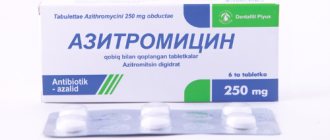The appearance of any allergic reactions during pregnancy is considered an alarming signal. And it doesn’t matter what exactly worries a woman - allergic rhinitis, rash or swelling - treatment must be carried out. In this case, therapy should be as effective and gentle as possible, taking into account the gestational age. Women are often prescribed Suprastin as an antihistamine, but reliable data on its effect on the fetus is still lacking. How Suprastin acts on the body of a pregnant woman, and what consequences may occur after treatment with this drug is the main topic of this article.
Is it possible to use Suprastin during pregnancy?
The appearance of an allergic reaction occurs under the influence of histamines. These are active substances that the immune system produces upon contact with an allergen. And the more aggressive this irritant is, the stronger the allergic process will occur. At the same time, the woman has all external symptoms, namely rash, itching and swelling, also present on the internal organs. To prevent the development of angioedema or anaphylactic shock during pregnancy, a woman is prescribed antihistamines - drugs that block the synthesis of histamine.
Suprastin is considered the most effective and conditionally safe drug. But, according to the information provided in the instructions, this drug is contraindicated during pregnancy. Why then is it often used in this period?
Doctors are guided by the fact that you need to choose the lesser of two evils. So, if a woman is in danger of suffocation or anaphylactic shock, then this is much more dangerous for the baby than taking Suprastin. But, given the complexity of the situation, this drug is prescribed only in extreme cases, when there is no other way out. In all other situations, Suprastin is replaced with other medications during pregnancy.
Prevention
To prevent allergic reactions, a woman should do the following:
- do wet cleaning twice a day;
- strengthen immunity;
- limit contact with pets;
- be exposed to stress as little as possible, because allergies and rashes often occur against the background of neuroses.
Allergies are an unpleasant disease that causes not only physical discomfort, but also emotional discomfort. It is especially difficult during the gestation period; women are prohibited from taking antihistamines and have to save themselves only by preventive measures. Suprastin is a strong drug, the annotation of which states that use is prohibited during gestation. But in extreme cases, when the benefit outweighs the harm, the doctor prescribes this remedy. It must be used strictly according to the prescribed regimen.
Taking Suprastin at different stages of pregnancy
Since there have been no clinical trials of Suprastin for negative effects on pregnancy and fetal development, this drug automatically falls into the group of prohibited drugs during gestation. But long-term practice of using Suprastin in obstetrics and gynecology shows that treatment can be carried out in the second trimester.
Suprastin during pregnancy - 1st trimester
All antiallergic drugs, including Suprastin, are not prescribed in the 1st trimester. Antihistamines are able to be instantly absorbed into the general bloodstream and overcome the placental barrier. In the first weeks after conception, the ingestion of these substances can disrupt the normal development of the embryo, causing congenital diseases in the future. However, it all depends on the severity of the allergy.
To eliminate the need to take anti-allergy medications, you need to isolate possible allergens. If you have a tendency to react to dust, lint or fur, do a wet cleaning twice a day and give your pets to friends for a while. The same goes for food allergies, so avoid all “allergic” foods.
Suprastin during pregnancy - 2nd trimester
The second trimester, compared to other periods, is the most favorable in terms of treatment. The baby is already mature and strong, and his mother’s immunity protects him. But he is also prone to the harmful effects of medications. Therefore, treatment is carried out in a strictly selected safe dosage and for a very short period until the woman’s condition stabilizes. During this period, tablets are prescribed, and in more severe cases, intravenous injections.
There are cases, according to official data from a research center in the USA, that the inappropriate use of Suprastin during pregnancy in the second trimester can cause disruption of blood flow in the placenta and complicate the life of the baby.
Suprastin during pregnancy - 3rd trimester
In the last trimester, taking Suprastin is also undesirable. This active substance has an aggressive effect on the woman’s nerve center, which can cause disruption of labor. At the same time, the baby may experience various respiratory system disorders after delivery.
Suprastin - instructions for pregnancy
If allergies during pregnancy cannot be stopped, the woman has to follow doctors’ orders and take Suprastin. To reduce the risk of side effects and complications, you must strictly follow the instructions.
Composition and pharmacological properties
Suprastin belongs to the group of systemic antihistamines. The active substance of the drug is chloropyramine. It is a chlorinated analogue of pyribenzamine (a histamine receptor blocker).
Chloropyramine is a first generation antiallergic element. Once in the gastrointestinal tract, it is absorbed within 15-20 minutes and after an hour it exhibits a full therapeutic effect that lasts 6 hours.
Suprastin exhibits stable antiallergic, antipruritic and sedative effects. The drug is able to relieve spasms, as well as influence the tone of smooth muscles, the permeability of the capillary system and the general condition of the central nervous system.
Suprastin is produced in two pharmaceutical forms:
- Pills. One tablet contains 25 ml of active substance. The auxiliary components are gelatin, lactose, stearic acid, as well as starch and talc.
- Ampoules. Each ml of solution for injection contains 20 mg of chloropyramine. In addition to the active substance, the preparation contains water for injection.
Suprastin during pregnancy. Indications and contraindications
Suprastin during pregnancy helps to cure the following allergic manifestations:
- Conjunctivitis of non-infectious origin.
- Allergic rhinitis.
- Contact dermatitis.
- Angioedema.
- Allergy to medications.
- Hay fever.
- Quincke's edema.
- Reaction to insect bites.
- Anaphylactic reaction.
- Hives.
- Allergic skin diseases.
Suprastin has a number of serious contraindications. The drug is not prescribed in the presence of the following diseases:
- Exacerbation of bronchial asthma.
- Pregnancy and lactation period.
- Cardiac arrhythmia.
- Certain eye diseases (glaucoma).
- Stomach ulcer.
- Risk of myocardial infarction.
- Hypersensitivity to chloropyramine.
- Problems with urine output.
- Bladder hypertrophy.
- Phytoplacental insufficiency.
Given the large list of contraindications, it is important to note that only a doctor should prescribe such a serious drug. Even a one-time use of a Suprastin tablet can cause serious complications in a pregnant woman and provoke disturbances in the development of her baby.
Suprastin during pregnancy. Directions for use and dosage calculation
By prescribing Suprastin during pregnancy, the doctor assumes great responsibility. The substances contained in the medicine have a very small molecular structure, so they easily cross the placental barrier.
It is clear that possible side effects that may occur in the mother can also occur in the baby. Therefore, the doctor must individually calculate the minimum therapeutic dose and draw up a clear schedule for taking Suprastin. As a rule, the daily dose is divided into several doses with equal time intervals between them.
This allows you to maintain the concentration of antihistamines at the required level, without causing severe harm to the baby’s health. A pregnant woman, in turn, must unquestioningly follow the prescribed treatment regimen.
Suprastin in tablet form is always taken with meals. The tablets should be swallowed whole with clean, still water. The daily dose of the drug is 75-100 mg, which corresponds to 3-4 tablets. The duration of therapy depends on the patient’s condition and can be adjusted by the doctor during the treatment period.
The drug in the form of injections is intended for intramuscular administration in a hospital or outpatient department. When anaphylactic shock occurs, the drug is administered intravenously.
Contraindications and possible negative consequences
The main contraindication to the use of this antihistamine is pregnancy. In addition, there are other taboos:
- individual intolerance to the active and auxiliary components of the drug;
- bronchial asthma in the acute stage;
- breast-feeding;
- increased eye pressure;
- acute diseases of the cardiovascular system;
- renal and liver failure;
- urinary retention.
Adverse reactions
The development of negative reactions after using Suprastin is a fairly rare occurrence. Moreover, these symptoms disappear almost immediately after stopping the medication.
Side effects:
- weakness and drowsiness;
- headache and dizziness;
- tremors and convulsions;
- nausea and vomiting;
- increased eye sensitivity to bright light and increased intraocular pressure;
- stool disorder;
- dryness of the mucous membranes of the oral cavity and loss of appetite;
- dysfunction of the cardiovascular system;
- pain and discomfort in the upper part of the peritoneum;
- irritability and nervous overexcitation.
If this medication is abused, an overdose is possible, which is manifested by the following symptoms:
- fever and hyperemia of the skin of the face;
- muscle weakness and lack of coordination;
- irritability and anxiety;
- hallucinations;
- convulsions;
- coma.
At the first symptoms of side effects or overdose, you must stop taking the drug and urgently seek advice from a specialist. A specific medication that neutralizes the effect of this antihistamine has not yet been found, so usually in a hospital setting the patient is given gastric lavage and prescribed a course of therapeutic therapy with absorbent medications: Polysorb, Smecta, Activated Carbon, and so on.
Suprastin during pregnancy: overdose and adverse reactions
An overdose can be fatal, especially in pregnant women and children. In case of accidental overdose, symptoms of general intoxication develop:
- Hallucinations.
- Tides.
- Fever.
- Urinary retention.
- Tachycardia.
- Pupil dilation.
- Feelings of fear and anxiety.
- Intense thirst.
- Cramps.
- Weakness.
- Cardiopulmonary collapse.
- Impaired coordination of movements.
- Coma.
When you first suspect an overdose, you should immediately seek medical help. Treatment includes sorbents and gastric lavage.
During treatment with Suprastin, pregnant women may experience various pathological reactions:
- Pain in different parts of the abdomen.
- Loss of appetite.
- Severe nausea and vomiting.
- Feeling of dry mouth.
- Constipation or diarrhea.
- Nervous exhaustion.
- Tremor of the limbs.
- Problems with coordination.
- Hypotension.
- Arrhythmia.
- Deviations in the blood formula.
- Muscle weakness.
- Photophobia.
- Glaucoma.
- Anorexia.
- Violation of intraocular pressure.
- Gastroesophageal reflux.
- Tachycardia.
With long-term use of Suprastin, a woman may develop blood diseases - anemia, leukopenia, thrombocytopenia. In addition, undesirable consequences such as bleeding, laryngitis, jaundice, and ulcerative lesions of the oral mucosa may appear.
In addition to all the above-mentioned adverse reactions, a woman may experience a malfunction in her immune system. This manifests itself in the form of a variety of allergic reactions: swelling, skin rashes, severe itching, hyperemia.
The appearance of the first signs of an incorrect reaction of the body to the treatment being carried out is an important signal to stop taking Suprastin and consult a doctor.
How can you replace Suprastin while pregnant?
Pharmaceutical companies offer a wide variety of antihistamines that fill pharmacy shelves. Therefore, Suprastin has both structural and functional generics. But this does not mean that these medications are interchangeable and the indications and contraindications for their use will be completely identical.
Generics Suprastin:
- according to composition and indications: Chloropyramine;
- strictly according to indications: Loratadine, Diazolin, Cetrin, Claritin, Zodak, Zyrtec.
Table: synonyms of Suprastin
| Trade name of the drug | Active substance | Release form | Indications for use. Possibility of use by pregnant women. | Contraindications | Possible negative consequences |
| Structural synonym | |||||
| Chloropyramine | Chloropyromine hydrochloride |
|
Chloropyromine is contraindicated for use by pregnant women in all trimesters of gestation. |
|
|
| Functional synonyms | |||||
| Zyrtec | Cetirizine dihydrochloride |
|
Pregnancy is on the list of contraindications to the use of these medications. Sometimes doctors prescribe these medications in the last two trimesters of gestation if the potential benefits of their use are much higher than the possible risks. |
|
|
| Claritin | Loratodine |
|
|
| |
| Loratodine | Loratodine | Tablets for oral use. |
| ||
| Zodak | Cetirizine dihydrochloride |
|
|
| |
Photo gallery: generics Suprastin
Video: Nadezhda Ilyintseva, allergist, about allergies during gestation
Features of the use of the drug Suprastin during pregnancy
Before starting treatment with this antihistamine, you need to take into account some features of its use, which include:
- Pregnant women are prescribed a reduced dose of the drug due to their predisposition to dizziness, weakness, and hypotension.
- If Suprastin is taken late in the day, the symptoms of heartburn may greatly intensify.
- Suprastin should absolutely not be combined with alcohol. Even a minimal amount of alcohol greatly enhances the effect of the drug, which has a bad effect on the nerve center.
- The drug has a strong effect on psychomotor functions, so at first the woman is not allowed to drive a car or operate machinery. The duration of such restrictions is set individually and adjusted over time.
- Suprastin contains lactose, so in women with impaired absorption of this carbohydrate, dyspeptic reactions may increase.
- The combined use of Suprastin and drugs that have ototoxic properties leads to masking of the negative effect on the hearing organs.
The principle of action of the drug
Suprastin is an antihistamine that stops the release of immune system cells. Histamine has a destructive effect on foreign irritant cells, but at the same time swelling, itching, and blisters appear at the site of interaction. The body's protective reaction to the allergen can cause suffocation, swelling of the larynx and lungs, digestive disorders, cough, runny nose, and purulent discharge from the eyes.
The drug blocks the formation of these cells - there is no reaction to the stimulus. But the use of suprastin cannot be considered a treatment for allergies; in this way it is not treated - only the unpleasant symptoms are removed. To further prevent a negative reaction, suprastin is used in prophylactic doses. If possible, protect yourself from the irritant - you need to do this.
The effectiveness of the drug is noticeable within 20 minutes after use; in case of complicated reactions and the need for a faster effect, intravenous or intramuscular administration is necessary.
Important! If an acute allergic reaction occurs, you must take a suprastin tablet and call a doctor.
Suprastin during pregnancy - reviews
Women who have been treated with Suprastin note a rapid positive effect from the drug. It quickly relieves progressive angioedema, swelling and itching after hornet bites, and eliminates allergies to flowering. Among the adverse reactions, women most often note excessive drowsiness, nausea, apathy and heartburn.
If all the doctor’s recommendations are followed, women give birth to healthy babies without any complications. Moreover, they all took Suprastin only after the 14th gestational week and in a dosage for children.
Suprastin during pregnancy can be used only if a woman has severe allergies and is prescribed jointly by an obstetrician-gynecologist and an allergist. You should not take this remedy on your own as it may affect your child's future health.
Indications for use
Suprastin is an antihistamine drug that facilitates allergic reactions and also prevents their development. Moreover, this drug has an antipruritic and sedative effect on the body, has antispasmodic properties, as well as anticholinergic activity. Suprastin during pregnancy can be taken from:
- hives;
- hay fever;
- serum sickness;
- hay fever;
- conjunctivitis;
- rhinitis;
- angioedema;
- anaphylactic shock;
- skin diseases: chronic and acute eczema, neurodermatitis, toxicerma;
- itching due to insect bites;
- acute respiratory viral infections;
- in the treatment and prevention of pseudoallergic reactions to medications.
As can be seen from the indications for the use of Suprastin during pregnancy in the 3rd trimester, these diseases and conditions can be very dangerous for the mother and baby.
Advantages and disadvantages of the drug
The best medicine against itching.
Helps quickly relieve Quincke's edema.
Reduces concentration.
Inappropriate associations appear.
Vomiting and nausea are possible.
General unpleasant condition.











